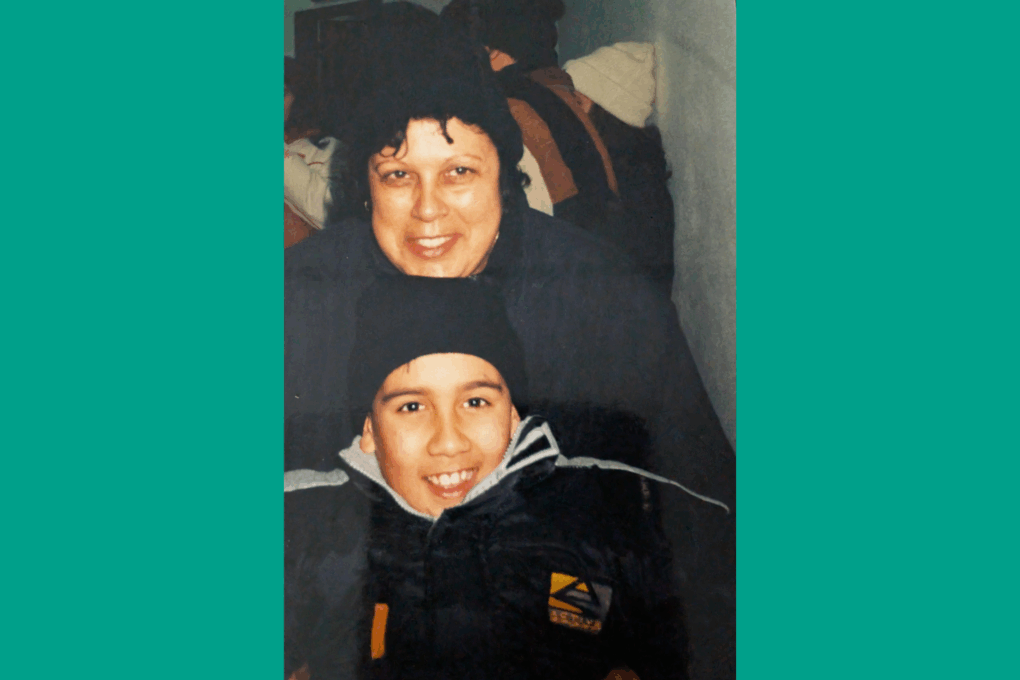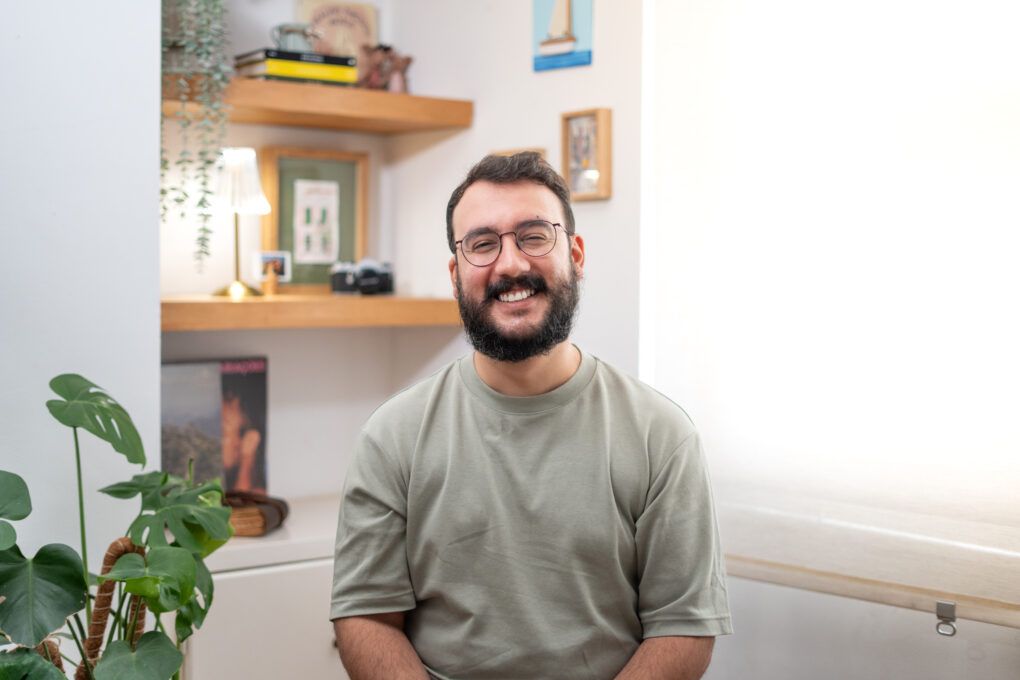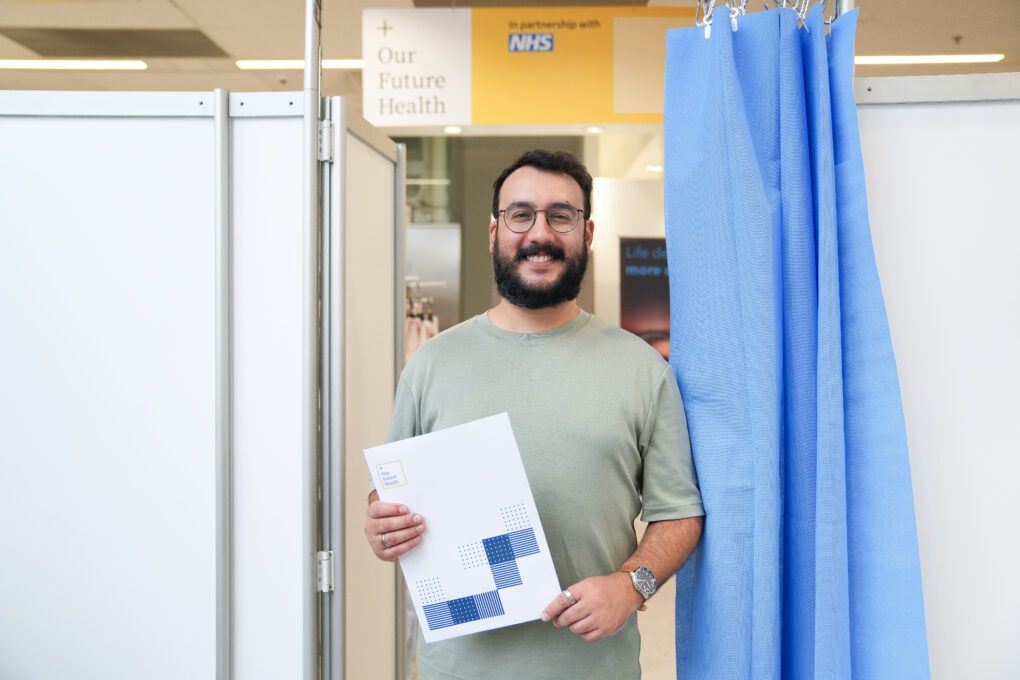‘We need more young men to help turn the tide on mental health by taking part in research’
33-year-old Our Future Health volunteer Nelson Costa remembers hearing the same phrases on repeat during his childhood. Phrases like ‘boys don’t cry’ and ‘just toughen up’.
After his parents’ divorce when he was 6 years old, Nelson and his mother lived as a duo in Portugal. It was a difficult time, and one that shaped the way he experienced the world as he grew up.
Today, Nelson lives in London with his partner and works in tech.
“I’ve always been drawn to technology, fascinated by the way things work and how they might be improved,” he says. “That curiosity led me to work in the gaming industry. It’s also part of why I joined Our Future Health.
“I’ve dealt with depression and anxiety for many years. When I heard that researchers could analyse the data to learn more about mental health conditions, I knew I had to take part.”
Our Future Health is the world’s largest resource for mental health research, and new work using our data set has already been published by mental health researchers.
Following his appointment at our Boots clinic in Central London, Nelson shared his story. He hopes it motivates others to join our programme, and encourages more boys and men to talk about their mental health.
Early experience

1 in 3 women worldwide experience domestic abuse in their lifetime. Nelson’s mother is one of those women.
“It was the origin of a lot of my trauma,” says Nelson. “What happened during that time stayed with me. I didn’t realise for a long time how much it shaped how I saw the world, and how everything I did later piled on top of that early trauma.”
Nelson says he didn’t have many people he felt able to talk to for advice about how he was feeling.
“Instead of asking me how I was feeling, people kept saying, ‘how does it feel to be the man of the house?’. I was just a child, but I was now expected to protect my mum.
“I didn’t understand what was happening in my emotions, so I couldn’t accurately express them. It wasn’t until I began therapy in my 20s that I realised how much of my behaviour tracked back to early experiences I hadn’t dealt with.
“Even now, I still feel sadness about what we went through. I used to think anger was the only emotion I was allowed to feel. Sadness and vulnerability weren’t an option.”
Nelson says that years of suppressing his emotions had an impact on his physical health.
“I have photophobia, a sensitivity to light that can come from prolonged stress. For so long, I felt I couldn’t cry, and that tension stayed in me. My mother did say it was OK to cry, but the world outside told me to toughen up, so I pushed my feelings down.
“By my mid-20s, I was very low. Sadness came out as anger, over small things like a fridge leaking or a button not working. When I started therapy, I learned that the anger was often covering other emotions.”
Seeking support

Alongside talking therapy, Nelson sees a psychiatrist and has been prescribed anti-depressants to help him to manage his depression.
“I was nervous about taking medication long-term and the financial burden of continued therapy and psychiatry,” he says. “But the medication worked well for me almost immediately, which is fortunate – it’s not everyone’s experience. It’s made my emotions less overwhelming, and that’s given me space to breathe.
“With time things have improved. My partner played a big part in that, and I’ve started to feel lighter. I remember one morning walking into the living room and seeing sunlight streaming through the blinds. It was so beautiful that I went to find my partner to show her.
“That moment meant so much to us. It was the first time in a long while that I could appreciate something simple like the sun shining into our home.”
Nelson still takes his medication and sees a therapist, but less frequently than before. “I’m working towards coming off my medication, carefully and with guidance. What’s changed most is my perspective. I now look back at that time and smile. Not because it was easy, but because I came through it.”
‘This is laying the foundation for change’

In the past, men under the age of 40 have been less likely to take part in health research than other age groups. Nelson says the situation needs to change.
“Our Future Health’s data can help researchers understand the root of conditions like depression and anxiety,” he says. “But everyone needs to take part – including young men. A diverse and representative data set will give a clearer picture of mental and physical health across different groups.
“I’m a big believer in backing things up with data. By taking part in Our Future Health, we can provide the evidence researchers need to make new discoveries in mental health care.”
Millions of people from across the UK have now joined our programme to help health researchers prevent, detect and treat diseases. As part of the joining process, people are asked to complete our health and lifestyle questionnaire, which includes questions about mental wellbeing.
These questions are designed to assess whether someone is currently experiencing the symptoms of depression and/or anxiety. By analysing the answers, we’re aiming to shine new light on the UK’s mental health.
“Our Future Health is laying the foundation for lasting and needed change,” says Nelson. “Society isn’t made up of one person doing one thing, it’s made up of lots of people getting behind common causes. I think Our Future Health is something we can all get behind.
“Everyone wants to live in a healthier world – contributing to this research is one way to help make that happen.”
Helplines and support
As a health research programme, we are unable to offer medical advice to our volunteers. If you are struggling with your mental health and need support, you can access the following free and confidential services:
- Samaritans – call 116 123 or visit samaritans.org for 24/7 support for anyone in emotional distress
- Shout – text SHOUT to 85258 to speak to a trained volunteer via text for 24/7 crisis txt support
- Mind – visit mind.org.uk or call 0300 123 3393 for information and support on mental health
- NHS urgent mental health helplines – call 111 or find your local service at NHS.uk/urgentmentalhealth
If you or someone you know is experiencing domestic abuse, visit refuge.org.uk.
You can also call the National Domestic Abuse Helpline on 0808 2000 247 for free and in confidence, 24 hours a day. If you are in an emergency, call 999.
About Volunteer Voices
Volunteer Voices tell the stories of people who take part in our research programme.
They take part because they want to help improve healthcare for others in the future.

Let’s prevent disease together
By volunteering for Our Future Health, you can help health researchers discover new ways to prevent, detect and treat common conditions such as diabetes, cancer, heart disease, stroke and Alzheimer’s.